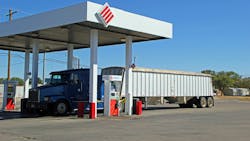Two interesting things are happening at the same time. One is that fuel prices are going up. I wrote about this a few weeks ago in this space. The other is that a recent survey conducted by Convoy of small and medium sized fleets found that fuel economy is one of the top factors when contemplating a new truck purchase.
Here’s a snapshot:
- 75% of fleets rated fuel economy as an important consideration in the truck purchase decision.
- 17% of the respondents have completed an eco-driving fuel efficiency training program, and of that subset, 92% believe fuel economy is important factor when purchasing a truck. I think that falls under the more you know the better off you are category.
- 36% of the fleets said they felt pressure to reduce carbon emissions either because of regulations, their awareness of the impact of carbon emissions, for personal reasons or to reduce operating costs.
We know that vehicle manufacturers are doing their part to make trucks more fuel efficient off the assembly line. The sleek aerodynamic designs of today’s trucks is going a long way to reduce fuel consumption. And, of course, there are a host of add on devices that improve the aerodynamics of both the tractor and the trailer.
There also is outside pressure on the industry from federal, state and municipal governments to reduce emissions. We are beginning to see zero-emissions goals being set and even some areas being designated as zero-emissions zones.
There are lots of things fleets can be doing to get more miles per gallon of fuel and to reduce their carbon footprint. Not every option is right for every fleet, but there are enough choices that I have 100% confidence in the fact that every fleet can find a cost-effective way to improve freight efficiency and/or reduce emissions. We’ve outlined the benefits and challenges of more than 85 currently available technologies in our Confidence Reports, which we continue to update as market factors change.
Here is a little tidbit from the survey: Trimming just 1% of empty miles from one long-haul truck can save more than 100 gallons of fuel. Reducing empty miles is one of those fuel efficiency strategies that costs nothing — other than time — to implement. And that is not the only “free” method to improve your operation.
I am encouraged by the results of this survey — albeit with a relatively small sample size. Smart fleets understand that anything they can do to reduce fuel consumption adds to their profitability. Many of those same fleets are also beginning their journeys to zero-emissions and that is a good thing too. But that is a topic for another blog. For now, I will encourage more fleets to continue to explore ways to make their current trucks and trailers as fuel efficient as possible while at the same time giving them a good return on their investment.
Michael Roeth has worked in the commercial vehicle industry for nearly 30 years, most recently as executive director of the North American Council for Freight Efficiency. He currently serves on the second National Academy of Sciences Committee on Technologies and Approaches for Reducing the Fuel Consumption of Medium and Heavy-Duty Vehicles and has held various positions in engineering, quality, sales and plant management with Navistar and Behr/Cummins.
About the Author

Michael Roeth
Executive Director
Michael Roeth is the executive director of the North American Council for Freight Efficiency. He serves on the second National Academy of Sciences Committee on Technologies and Approaches for Reducing the Fuel Consumption of Medium and Heavy-Duty Vehicles and has held various positions with Navistar and Behr/Cummins.
